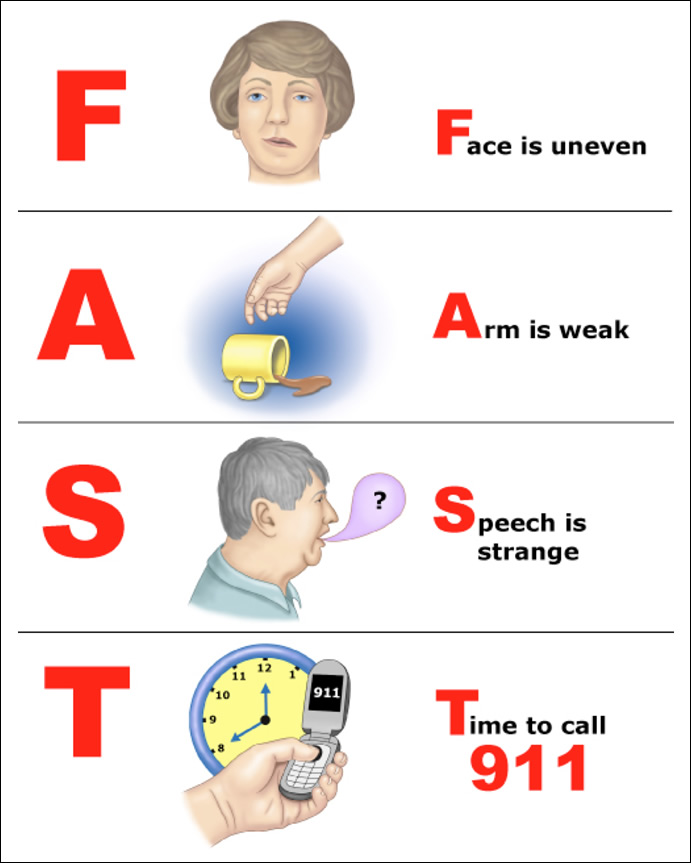Stroke
Our mission is to improve the health and well-being of our Bay Area residents through integrated and compassionate patient care, education and research.
Welcome new doctors
Upgraded new patient portages
Redesigned website
Stroke
Stroke
What is a stroke?
Stroke is the term doctors use when a part of the brain dies because it goes without blood for too long. Strokes can happen when the blood supply to a part of the brain is cut off, because:
- An artery in the brain gets clogged, or
- An artery in the brain starts bleeding
How do strokes affect people?
The effects of a stroke depend on a lot of things, including:
- Which part and how much of the brain is affected
- How quickly the stroke is treated
Some people who have a stroke have no lasting effects. Others lose important brain functions. For example, some people become partly paralyzed or unable to speak. Stroke is one of the leading causes of death and disability in the United States.
How can you tell if someone is having a stroke?
There is an easy way to remember the signs of a stroke. Just think of the word “FAST”. Each letter in the word stands for one of the things you should watch for:
- Face – Does the person’s face look uneven or droop on one side?
- Arm – Does the person have weakness or numbness in one or both arms? Does one arm drift down if the person tries to hold both arms out?
- Speech – Is the person having trouble speaking? Does his or her speech sound strange?
- Time – If you notice any of these stroke signs, call 9-1-1. You need to act FAST. The sooner treatment begins, the better the chances of recovery.
The letters in the word “fast” help you remember the signs of stroke. If a person shows any of these signs, call 9-1-1 right away.

How are strokes treated?
The right treatment depends on what kind of stroke you are having. To figure this out, you need to get to the hospital quickly.
People whose strokes are caused by clogged arteries can:
- Get medicines that break up blood clots. These medicines can help reopen clogged arteries.
- Get medicines that prevent new blood clots. These medicines also help prevent future strokes.
People whose strokes are caused by bleeding can:
- Have treatments that reduce the damage caused by bleeding in or around the brain
- Stop taking medicines that increase bleeding, or take a lower dose
- Have surgery to repair the artery or stop the bleeding (this is not always possible to do)
Can strokes be prevented?
Yes. You can reduce your chances of having a stroke by:
- Getting treated for high blood pressure (This is very important. It might involve taking one or more medicines.)
- Not smoking
- Being active
- Controlling your blood sugar if you have diabetes
- Losing weight if you are overweight
- Eating lots of fruits, vegetables, and low-fat dairy products, but not a lot of fatty or salty foods
- Taking your medicines exactly as directed. Medicines that are especially important in preventing strokes include:
- Blood pressure medicines
- Medicines to prevent blood clots, such as daily aspirin or warfarin (sold as Coumadin®)
- Medicines called statins, which lower cholesterol
Another way to prevent strokes is to have surgery to reopen clogged arteries in the neck. This surgery is appropriate for only a small group of people.
What is a “TIA”?
A TIA is like a stroke, but it does not damage the brain. TIAs happen when an artery in the brain gets clogged and then reopens on its own. This can happen if a blood clot forms and then moves away or dissolves. TIA stands for “Transient Ischemic Attack.”
Even though TIAs do not cause lasting symptoms, they are serious. If you have a TIA, you are at high risk of having a stroke. It’s important that you see a doctor and take steps to prevent that from happening. Do not ignore the symptoms of a stroke even if they go away!
